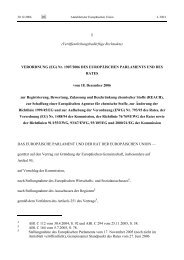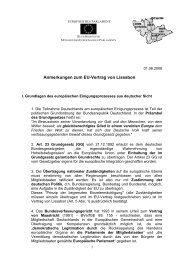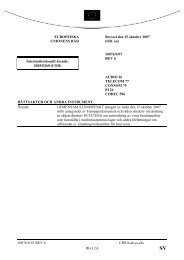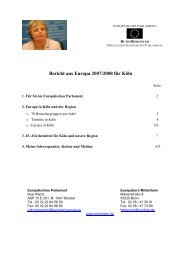mødet onsdag i den 13. marts 2002 sitzung am mittwoch i, 13. märz ...
mødet onsdag i den 13. marts 2002 sitzung am mittwoch i, 13. märz ...
mødet onsdag i den 13. marts 2002 sitzung am mittwoch i, 13. märz ...
You also want an ePaper? Increase the reach of your titles
YUMPU automatically turns print PDFs into web optimized ePapers that Google loves.
13-03-<strong>2002</strong> 47<br />
- Report Paulsen (A5-0043/<strong>2002</strong>)<br />
3-136<br />
Ebner (PPE-DE). - Herr Präsi<strong>den</strong>t! Ich möchte erklären, dass ich für <strong>den</strong> Bericht Paulsen gestimmt habe und vor allem<br />
auch für <strong>den</strong> Änderungsantrag 10. Ich bin grundsätzlich der Auffassung, dass wir Hygienebestimmungen sehr aufmerks<strong>am</strong><br />
und sehr streng einhalten und auch die Standards entsprechend erhöhen müssen. Es ist aber sinnlos, dass wir Wertstoffe,<br />
und Speisereste sind Wertstoffe, sinnlos vernichten und dass durch die Vernichtung noch Kosten für die Allgemeinheit<br />
entstehen, wenn wir die Möglichkeit haben, diese in sinnvoller Weise zu nutzen. Ich bin froh, dass das Europäische<br />
Parl<strong>am</strong>ent diesen Weg mitgegangen ist, wenn auch knapp. Ich hoffe, dass wir im Zuge der weiteren Vorgehensweise auch<br />
die entsprechende Zustimmung von Seiten der Kommission erhalten, dass eben Wertstoffe nicht wahllos vernichtet<br />
wer<strong>den</strong>, was auch noch mit Kosten verbun<strong>den</strong> ist, sondern wiederverwertet und genutzt wer<strong>den</strong> können.<br />
3-137<br />
Graefe zu Baringdorf (Verts/ALE). - Herr Präsi<strong>den</strong>t! Vielen Dank dafür, dass Sie mir ermöglicht haben, <strong>den</strong> mündlichen<br />
Änderungsantrag einzubringen und auch noch zu begrün<strong>den</strong>. Er ist leider an der erforderlichen Zahl von 314 Stimmen<br />
vorbeigeschr<strong>am</strong>mt. Das ist für <strong>den</strong> Antrag etwas ärgerlich, aber ändert nichts daran, dass das Parl<strong>am</strong>ent nun in<br />
Kompromissantrag 25 gefordert hat, dass die Kommission eine legislative Vorlage machen muss. Dann sind wir im<br />
Mitentscheidungsverfahren und regeln es dann in einer eigenen Verordnung. Ich appelliere an die Staaten, die sich bislang<br />
nur für ein Verbot ausgesprochen haben, doch auch dafür zu sorgen, dass diese Stoffe, die, wenn sie nicht or<strong>den</strong>tlich<br />
behandelt wer<strong>den</strong>, gefährlich sind, ordnungsgemäß vernichtet wer<strong>den</strong>. Ich erwarte von der Kommission, dass sie in dieser<br />
Übergangszeit bis zum Vorliegen einer Verordnung, die alles regelt, ihre Kontrollfunktionen wahrnimmt, d<strong>am</strong>it wir die<br />
Katastrophen, die wir erlebt haben - Maul- und Klauenseuche, Schweinepest -, die von unbehandelten Speiseresten<br />
kommen können, nicht noch einmal erleben.<br />
(Beifall)<br />
3-138<br />
Grossetête (PPE-DE), par écrit. – J'ai toujours privilégié la santé et la protection du consommateur.<br />
J'aimerais faire deux remarques essentielles sur des points pour lesquels je me suis battue en Commission parlementaire.<br />
Les décisions de l'Union européenne doivent être cohérentes. Aussi, y a-t-il lieu, pour être efficace, de ne pas multiplier les<br />
règlements ayant trait aux mêmes sujets. En arrêtant des règles pour la prévention, le contrôle et l’éradication des<br />
encéphalopathies spongiformes transmissibles, le règlement (CE) n°999/2001 soumet déjà les sous-produits d’animaux des<br />
abattoirs de ruminants et des ateliers de désossage de la viande de ruminants à des règles sanitaires rigoureuses et<br />
contrôlées. Aussi, pour des raisons de cohérence et de bonne application, est-il superflu d’inclure ces établissements dans<br />
le ch<strong>am</strong>p d’application d’un deuxième règlement poursuivant les mêmes objectifs.<br />
L'Union européenne doit également prendre des décisions applicables. Or, nous savons que les capacités de traitement et<br />
de destruction (incinération ou mise en décharge) ne peuvent permettre l’application, au niveau du territoire<br />
communautaire, de mesures exécutables à trop bref délai lorsqu'elles visent les effluents produits par les stations<br />
d’épuration des abattoirs, qui sont souvent des stations d’épuration communes - qu'elles soient classées en catégorie 1 ou<br />
en catégorie 2. Ces lacunes sont not<strong>am</strong>ment apparues lors de l’interdiction des farines animales dans l’alimentation<br />
animale qui a contraint les Etats membre à stocker ces farines en quantité importante dans l'attente de leur incinération.<br />
Ajouter plusieurs millions de tonnes de produits à détruire ou à traiter avant valorisation imposerait de nouvelles<br />
contraintes de stockage, faute de possibilité de traitement ou d’incinération en flux tendu. Or, nous savons que le stockage<br />
peut comporter un risque sanitaire et environnemental. Il est donc nécessaire de mettre en place un calendrier adéquat<br />
permettant une gestion communautaire raisonnée, sûre et respectueuse de l’environnement.<br />
3-139<br />
Hyland (UEN), in writing. - I would like to commend the rapporteur Ms Paulsen for her work on this important report.<br />
The BSE crisis of recent years must never again threaten European consumers, farmers and the beef industry. I believe that<br />
great credit is due to the Commission for systematically putting forward a series of legislative proposals which aim to<br />
address each and every one of the issues surrounding the original crisis.<br />
The Commission and the Member States have taken the necessary steps, with the full co-operation of the farming<br />
community and the beef industry, to guarantee safe farming and food production practices and a safe product for the<br />
European consumer as well as for our vital export markets. Many actions and measures taken have brought with them<br />
great sacrifice and we must remain conscious of that.<br />
This particular proposal aims to establish a single legal fr<strong>am</strong>ework to clarify conditions for treating animal by-products.<br />
Most importantly, the only by-products which should end up in animal feed, and consequently the food chain, are those<br />
by-products which would be fit for direct human consumption. In other words, if you can’t put a spoon of the stuff in your<br />
cup of cocoa at night then you shouldn’t be feeding it to the pigs either.







